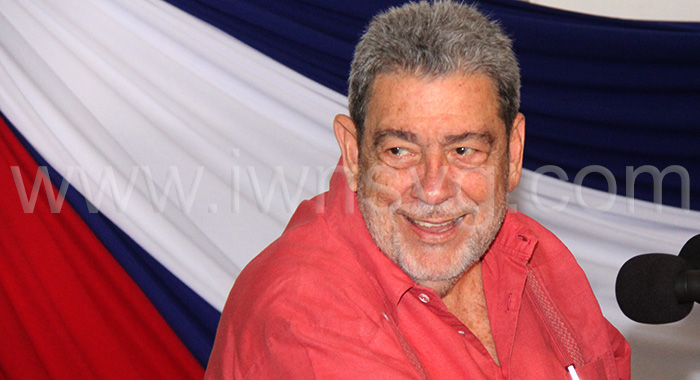Prime Minister Ralph Gonsalves says he had a “very positive” meeting with US officials amidst threats by the Donald Trump administration to revoke the US visas of officials and their families in countries where Cuban professionals work with the government.
“I think the result was very positive. And all the officials whom I spoke to thought that the meeting went very well. So, too, my Cabinet colleagues who were present; whom I required to be present,” Gonsalves said on WE FM on Sunday.
“And I didn’t hide anything, and they asked a lot of questions, and we answered the questions,” Gonsalves said, days after announcing that he was gathering the data that the US had requested about the programme.
“In fact, I told them that it is unfortunate that we have to spend so much time on a matter which is really having me go down a rabbit hole with them, metaphorically; like we should be talking about other things to strengthen our cooperation — complicated world,” the prime minister said.
He said the US representatives visited St. Vincent and the Grenadines on Wednesday.
“I told the Ministry of Foreign Affairs, ‘I don’t want them to go around and meet individual officials and individual ministers.’
“I called everybody together at the Cabinet Room, including them, so that they can use their time wisely and spend two hours with them,” Gonsalves said.
He said he went through “everything” with the US representatives. “I have them ask questions. I say you can ask anybody here. I had all the relevant permanent secretaries. I had the labour commissioner. I had the ministers of health, agriculture, works, education.”
He said he referenced the details of the agreement between Kingstown and Havana.
“… they’re sitting next to me where I had the agreement, and they could look at it, but I can’t give them a copy of the agreement because there’s a confidentiality clause, as in all agreements between sovereign states,” the prime minister said.
He said that under that clause, he could only make the agreement available otherwise after the expiration of a year after the end of the agreement, “or if I ask the Cuban government if they can waive the confidentiality provision.
“I haven’t asked them. I’ve discussed the matter overall with the Cuban ambassador here,” Gonsalves said.
“And it’s not in my place to ask them, because this is a sovereign agreement, between two sovereign countries. In other words, I’m being helpful but within the principles that you would acknowledge, as a student of international relations and international law, I have to respect all of those things.”
Gonsalves said that the US team was “surprised, for instance, that we have persons here working with us from Cuba, who didn’t come in on any programme through the government.
“For instance, we have six persons in education not coming through the Cuban government, and one of them is also a pastor in a church. … actually. These people come and go, they’re surprised that the individual Cubans who are here on the programme through the government, that the monies are put into the bank, and they have their own bank cards, like everybody else.
“I don’t know what notion some people in the south of Florida, some ideologues and politicians or in some taverns in the south of Florida, what they think.”
The prime minister said SVG has “very progressive labour laws, and we subscribe to all the conventions.
“They’re, for instance, surprised that at the end of — say, somebody has a three-year contract, part of the contract is that they get 30 days holidays, and they can go back to Cuba if they want. And if they go back to Cuba, we pay for their passage, going for the holidays, and pay for them coming back,” Gonsalves said.
He emphasised that the Government of SVG pays for the Cuban workers to travel to Cuba and back during their vacation.
“Which other worker in St. Vincent gets [that]? And if you have to go through Trinidad, or Barbados, or Panama to get to Cuba, and you have any expenses in between, … you keep the bills, we’ll pay for them. We’ll pay for those expenses in between because we value the Cubans and we value our own, too, and our own have certain benefits.”
He said his team showed the US representatives the compensation packages and the relationship.
“And look, they have a view of some things which might have happened in the past, not in St. Vincent. And there’s also a change in immigration regulations from Cuba.
“They’re surprised to find out that there are Cubans who have government contracts, at the end of the contract, they go back to Cuba and they say, ‘Well, listen, we don’t want to work anymore with the Cuban government in any way. We’re coming back to St Vincent and the Grenadines.’ And they come back here.”
He said some Cuban workers who have been in SVG for five years get permanent residence while others who marry Vincentians or have lived in the country for seven years or more get citizenship.
“The Americans are surprised that these things — the American officials.; it’s just a normal relationship. There’s no forced labour.
“They enter the programme voluntarily. They’re recruited,” he said, adding that his government recently sent a team to Cuba “to make sure that the level of their English is acceptable in the practice of their particular profession”.
He said the Cuban doctors in SVG work a maximum 40 hours a week — no more than eight hours in a day” but would also be called in for emergencies.
“… but outside of those hours, they can — many of them do practice privately and earn additional money.
“… I have a bundle of information. I’m putting all that together.”






